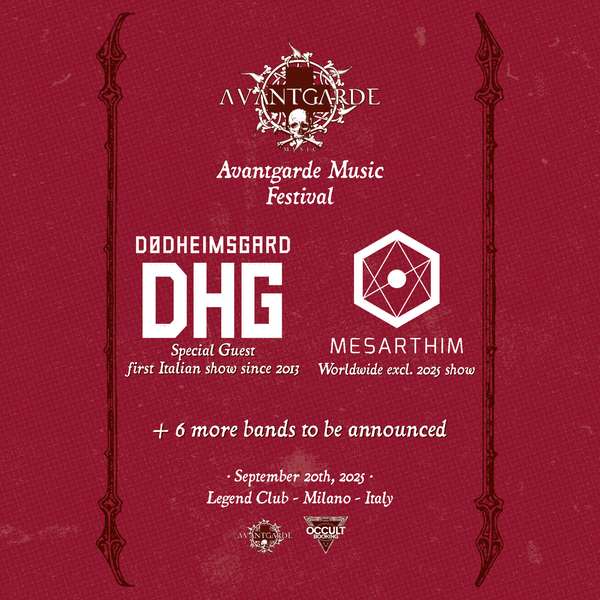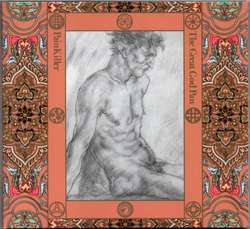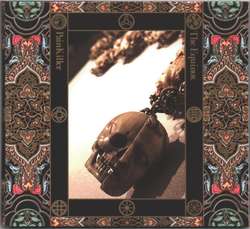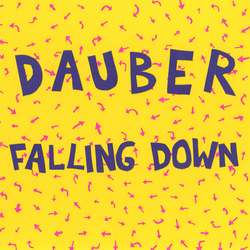It always takes a while for Dodheimsgard (DHG) to release a new album, but it is also always worth the wait. The experimental alchemists from Norway started off their career back in the mid ‘90s when the second wave of black metal bands was starting to come together. The core of the band back then with the release of their debut album Kronet Til Konge was Aldrahn (guitars and vocals) and Vicotnik (drums and vocals), while Fenriz of Darkthrone provided the bass for the album. Kronet Til Konge and its follow up Monumental Possession was seeing the band in their earlier stage of creating their own sound, with the music being directed towards a more melodic black metal with thrash influences kind of vibe. But that would not be the case for much longer.
The turning point for the band was the Satanic Art EP which was released back in 1998 and it featured the first signs of what DHG were evolving into. With Vicotnik taking over the guitars and programming for the EP, Aldrahn still providing some of the most tremendous vocal performances and the inclusion of Svein Egil Hatlevik (of Fleurety) on piano and Galder (of Old Man’s Child) on guitars, still with Apolyon on the band but on the drums this time, the scene was set perfectly. Even though the sound of the band still had its basis on the black metal spectrum, the music had progressed in an unthinkable manner, with songs such as “The Paramount Empire,” “Symptom” and especially “Traces of Reality” giving rise to what DHG were going to represent from now on.
Just one year after the release of Satanic Art the band would return to offer what is considered their most complete work to date, 666 International. With the line-up changing once more to include Czral (of Virus, Ved Buens Ende), 666 International saw Vicotnik reuniting with his old Ved Buens Ende bandmate. The album itself is one of the most difficult to stomach experimental albums out there. With the black metal foundation being mutated by the inclusion of industrial, dark ambient, psychedelia and jazz, DHG were being led into a realm of endless possibilities. The terrific vocal lines of Aldrahn alongside the acid guitar sound of Vicotnik were revealing a new manner of operation for the band. Frantic rhythms and chaotic patterns emerged and ambient parts collided with each other into one of the most ambitious albums to be produced.
The sad thing about all this is that after 666 International, DHG took some time in order to produce their next full-length, Supervillain Outcast. The line-up of the band was altered completely with only Vicotnik remaining as the only founding member of the band, and Czarl as a guest drummer, it also included Thrawn and Clandestine (both of Paradigma) and Kvohst (of Code) on vocals. The album found the band in a much more aggressive phase with the distinctive compositions of Vicotnik focusing on a more destructive and less experimental aspect of the band. Still experimental in its core but not to the same degree as its predecessor, Supervillain Outcast was different from what was expected but no less interesting.
Another eight years would need to pass in order for DHG to return with their latest album, A Umbra Omega. With Aldrahn returning alongside Vicotnik, everything was making perfect sense for DHG’s next full-length. The black metal foundation of the band is still going strong and it is what you find after the intro of the album, “The Love Divine.” The Voivod-ian influence on Vicotnik’s guitar work was always present and in A Umbra Omega that part remains prevalent, with DHG changing between quite a few different attitudes in their music. From the eerie leads of songs such as “God Protocol Axiom” and “Architect of Darkness” to the perfect storm outbreaks of “Aphelion Void” and “The Unlocking,” the guitars retain their poisonous edge and discordant quality, while DHG travel to different extremes of their black metal sound. The closing song of the album, “Blue Moon Dial” shows a more old school when it first appears, but the evolution of the track through its fourteen minutes reaches an almost cyber black metal attitude halfway through. That is enough to understand how varied, just the black metal sound of DHG can become.
The industrial influence of DHG was an important part of the band’s sound in 666 International and to a lesser extent in Supervillain Outcast, but it seems that this part of the band has regressed further in A Umbra Omega. A few slight nodes to this attitude are still found in the album, mainly in parts of the opening song with the more mechanized vibe the band is taking on, and with the mysterious background percussion in “The Unlocking.” Instead of that industrial aspect, DHG give rise to a more psychedelic and ambient personification in A Umbra Omega.
After the black metal outbreak of the opening song, DHG give rise to an ambient part which in conjunction with the saxophone and unearthly vocal performance finds the band in a more laid back, almost jazz-like moment. The trip to the dark side is resumed numerous times through the songs of A Umbra Omega, sometimes giving rise to a terrifying feeling, quite dominant in “Aphelion Void,” and other times with a mystical quality, as is the case with “God Protocol Axiom.” What is though quite interesting here is that suddenly DHG take on a different approach with their music. Throughout their discography they were trying to create their complex structures without transmitting an emotional aspect of their music to the listener. Their goal was to make the process as difficult as possible, but that is something that has changed a fair bit with their latest offering. The album seems to be much more expressive and melancholic than the previous works of the band, leading to new ideas finding place within the music of the band. The acoustic guitar parts in songs such as “The Unlocking” and “Aphelion Void” reveal the depth that DHG are willing to travel to with this release.
The psychedelic quality of DHG seems to also be on the spotlight with this album, with moments of clean guitar mastery in “The Unlocking” giving a more trippy outlook from the band, something that also happens when the saxophone is introduced in “God Protocol Axiom.” Through the frenzied patterns that the band explores with their music, the effect of their psychedelic-jazz collision is enhanced even further. The fluidity with which the mind bending parts of “Blue Moon Dial” are presented, alongside the liquid sound of the bass, in tracks such as “Architect of Darkness,” find the band navigating their themes with much more ease. In Supervillain Outcast and in 666 International it felt like the band was pushing their experimental state to extreme but in A Umbra Omega DHG have a much better fluency with which their alchemical ideas are unfolding.
But DHG do not stop there, and for A Umbra Omega they start to take on a more majestic form. Suddenly in “God Protocol Axiom” they throw in the crazed piano parts, which seem to have also become a big part of their sound in this instance. The frenzied, devilish patterns that he piano follows, especially in songs such as “The Unlocking” and “Architect of Darkness,” bring to mind fellow Norwegian experimentalists Arcturus. But DHG’s parts have a more melancholic tonality to them which fits perfectly with Aldrahn’s insane vocal range. From the chaotic performances of “God Protocol Axiom” and “Aphelion Void” to some deeper vocals, the voice of Aldrahn is capable of creating a plethora of different characters that narrate the darkest of stories. Throw in all that the chants that the majestic parts feature and you have quite more than anyone can handle.
With A Umbra Omega, DHG are at their best. The band has never dwelled into just one side of their music and with their latest album they continue to expand their horizons. The album is as bitter and broadminded as anything they have done since the Satanic Art EP, but it gives rise to different aspects of the band. The incorporation of a stronger psychedelic and ambient vibe, the melancholic tonality of the album and the inclusion of majestic and melodic moments do not taint their sound. On the contrary, they just make them even more intriguing to listen to.





